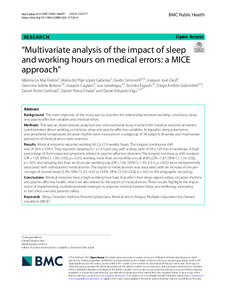Por favor, use este identificador para citar o enlazar este ítem:
https://repositorio.uca.edu.ar/handle/123456789/18347| Título: | Multivariate analysis of the impact of sleep and working hours on medical errors: a MICE approach | Autor: | Mul Fedele, Malena Lis López Gabeiras, María del Pilar Simonelli, Guido Diez, Joaquín José Bellone, Giannina J. Cagliani, Joaquín Larrateguy, Luis Eiguchi, Kumiko Golombek, Diego A. Cardinali, Daniel Pedro Pérez Chada, Daniel Vigo, Daniel Eduardo |
Palabras clave: | SUEÑO; RITMO CIRCADIANO; MEDICOS; NEGLIGENCIA; FATIGA; ERRORES MÉDICOS | Fecha de publicación: | 2023 | Editorial: | BioMed Central | Cita: | Mul Fedele, M.L., López Gabeiras, M., Simonelli, G. et al. Multivariate analysis of the impact of sleep and working hours on medical errors: a MICE approach [en línea]. BMC Public Health. 2023, 23, 2317. doi: 10.1186/s12889-023-17130-4. Disponible en: https://repositorio.uca.edu.ar/handle/123456789/18347 | Resumen: | Abstract: Background The main objective of this study was to describe the relationship between working conditions, sleep and psycho-affective variables and medical errors. Methods This was an observational, analytical and cross-sectional study in which 661 medical residents answered questionnaires about working conditions, sleep and psycho-affective variables. Actigraphic sleep parameters and peripheral temperature circadian rhythm were measured in a subgroup of 38 subjects. Bivariate and multivariate predictors of medical errors were assessed. Results Medical residents reported working 66.2 ± 21.9 weekly hours. The longest continuous shift was of 28.4 ± 10.9 h. They reported sleeping 6.1 ± 1.6 h per day, with a sleep debt of 94 ± 129 min in workdays. A high percentage of them reported symptoms related to psycho-affective disorders. The longest continuous shift duration (OR = 1.03 [95% CI, 1.00–1.05], p = 0.01), working more than six monthly on-call shifts (OR = 1.87 [95% CI, 1.16–3.02], p = 0.01) and sleeping less than six hours per working day (OR = 1.66 [95% CI, 1.10–2.51], p = 0.02) were independently associated with self-reported medical errors. The report of medical errors was associated with an increase in the percentage of diurnal sleep (2.2% [95% CI, 0.1–4.3] vs 14.5% [95% CI, 5.9–23.0]; p = 0.01) in the actigraphic recording. Conclusions Medical residents have a high working hour load that affect their sleep opportunities, circadian rhythms and psycho-affective health, which are also related to the report of medical errors. These results highlight the importance of implementing multidimensional strategies to improve medical trainees’ sleep and wellbeing, increasing in turn their own and patients’ safety. | URI: | https://repositorio.uca.edu.ar/handle/123456789/18347 | ISSN: | 1471-2458 | Disciplina: | MEDICINA | DOI: | 10.1186/s12889-023-17130-4 | Derechos: | Acceso abierto | Fuente: | BMC Public Health. 2023, 23, 2317 |
| Aparece en las colecciones: | Artículos |
Ficheros en este ítem:
| Fichero | Descripción | Tamaño | Formato | |
|---|---|---|---|---|
| multivariate-analysis-impact.pdf | 1,54 MB | Adobe PDF |  Visualizar/Abrir |
Este ítem está sujeto a una Licencia Creative Commons

